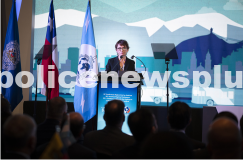SANTIAGO, Chile: The focus of INTERPOL’s 25th Americas Regional Conference is enhancing transnational cooperation to tackle current and emerging regional crime threats.
Drug trafficking, human trafficking, environmental crime and cybercrime are among the key issues that will be addressed during the three-day conference (21 – 23 March) with countries sharing their insights and expertise towards developing a cohesive regional strategy.
In the opening meeting, Chile’s Minister of Interior and Public Security Carolina Tohá Morales, said: “INTERPOL is not a political organization, but it does require political support. My presence is to tell you that for our President, this organization can count on our support, first line support, because we understand it as fundamental in order to combat crime.”
INTERPOL-coordinated operations across the region, such as Operation Turquesa IV targeting human trafficking and migrant smuggling across Latin America and the Caribbean, have seen significant results in additional to highlighting the global nature of organized crime.
Sergio Muñoz Yáñez, Director General of the Policia de Investigaciones de Chile (PDI) said: “The term ‘globalization of crime’ is a reality that today plagues every part of our continent. A united and collaborative police community is the best strategy to tackle transnational organized crime.
“The values and principles that inspired the creation of INTERPOL 100 years ago remain more alive and permanent than ever.”
Crime trends in the Americas
Illicit firearms trafficking, online child sexual abuse and ransom ware were highlighted among the region’s top crime threats, according to INTERPOL’s 2022 Global Crime Trend Report
“This week’s conference brings together INTERPOL members from across a strategic region which represents more than one billion people,” said INTERPOL President Ahmed Naser Al-Raisi.
“Our discussions in coming days are an opportunity to understand how we can better protect them, and dive deeper into the crimes that threaten safety across the region.”
Encouraging even greater use of INTERPOL’s 19 global databases is also a key issue. Containing some 127 million records, more than 1.3 billion checks have been carried out so far in 2023, resulting in some 283,000 hits – each a potential break in an investigation.
“No criminal landscape is alike across the world. Whether across the Americas or in the rest of the globe, some dynamics are borderless. These are the threats we face,” said INTERPOL Secretary General Jürgen Stock. “Ensuring fast, efficient and secure sharing of actionable police information is at the heart of INTERPOL’s mission and why we are gathered here today.
100 years of supporting Americas law enforcement
The Americas region has played a central role in INTERPOL’s 100-year history since the Organization was founded in 1923. The United States of America was one of 20 countries represented at the police congress in Vienna, Austria that established the International Criminal Police Commission, as INTERPOL was originally called.
In 1965 the Organization held its first Americas Regional Conference in Rio de Janeiro, Brazil and in May 1990 an agreement was signed with Argentina for the establishment of an INTERPOL Regional Office for South America, the first of its kind.
This would eventually become the Regional Bureau in Buenos Aires which today serves 12 countries, and in September 2003, the Regional Bureau for Central America was opened in San Salvador.
The Regional Bureau in Buenos Aires also hosts one of the Organization’s three Command and Coordination Centres – the first point of contact for any country requiring urgent assistance from the General Secretariat or from another country.










